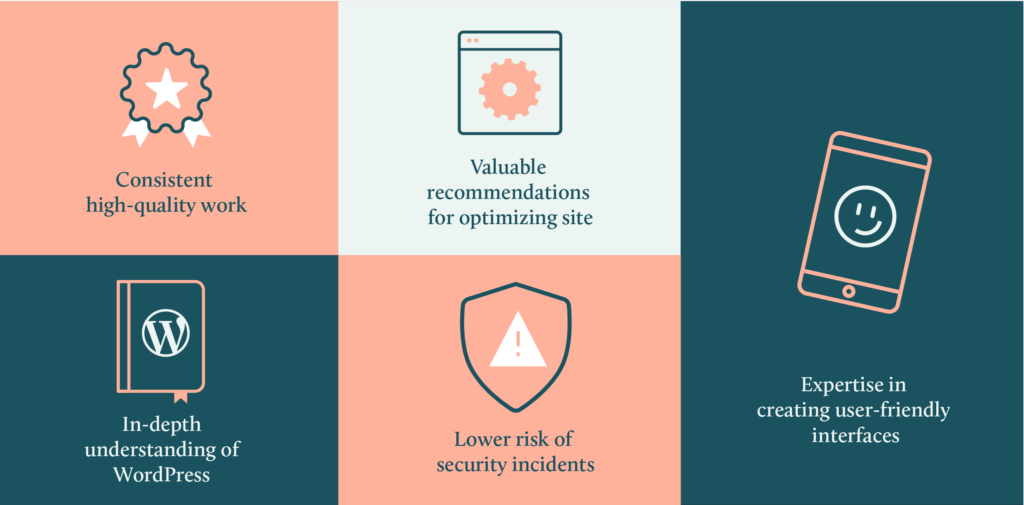
WordPress Developer Compensation Guide: Salary Trends, Factors, and Strategies for 2024
Decoding the Cost of Hiring a WordPress Developer in 2024
Since its inception in 2003, WordPress has evolved from a simple blogging platform into a powerful Content Management System (CMS), used and loved by millions worldwide. With this growth has come a surge in demand for WordPress developers, making it crucial for everyone involved to understand their compensation. For business owners and hiring managers, offering competitive salaries is a strategic approach to attract and retain top talent. In turn, salary transparency allows developers to negotiate fair compensation and evaluate job opportunities.
This blog will shine a light on both global and U.S.-specific salaries for WordPress developers. We’ll explore full-time and freelance rates and answer some important questions such as:
- The average salary and hourly rates for WordPress developers
- The influence of geographic locations on WordPress developer salaries
- The expected compensation for WordPress developers in different sectors and companies
- A comparison of full-time salaries to freelance WordPress earnings
Pay Scale for WordPress Developers: An Insight
Current Salary Trends
The salary of WordPress developers can vary greatly based on variables like years of experience, skill level, and location. According to data from Talent.com, the average annual salary for WordPress developers is $77,500, equivalent to about $32.76 per hour. In contrast, ZipRecruiter estimates that WordPress developers earn around $41 per hour on average, with the highest average hourly rate at $75.24. Entry-level positions can pay up to $57,186 annually, while the most experienced developers can earn around $112,563 per year.
Global Factors Impacting Salary Trends
Several factors, including economic conditions, remote work, and technological advancements, have affected WordPress developer salaries. Here’s how:
- Economic Conditions: Strong economies may lead to higher demand and better salaries, while economic downturns can result in lower wages.
- Remote Work: The shift towards remote work has enabled companies to hire talent from around the world, leading to a more competitive job market. Companies may also adjust salaries based on the local market conditions of the talent.
- Technological Advancements: As the demand for skills like Artificial Intelligence (AI) and cybersecurity increases, developers with these skills can likely command higher salaries.
Benefits and Bonuses
Full-time WordPress developer positions often come with additional benefits, like healthcare coverage, retirement plans, and performance-based or annual bonuses. While freelancers may not have the same benefits, they can still negotiate for perks or bonus structures in their contract agreements. For instance, they could negotiate a higher rate for taking on more responsibilities or ask for access to paid software needed for project completion.
Increasing Your Earnings as a WordPress Developer with Codeable
Platforms like Codeable can significantly boost a WordPress developer’s salary in different ways:
- High-value Clients: Codeable connects developers with serious clients who are willing to pay appropriately for high-quality work.
- Rigorous Vetting Process: Only highly skilled and experienced WordPress developers are accepted onto the platform, leading to higher payouts for developers.
- Competitive Wages: Codeable offers developers a minimum rate of $80-120 per hour on a project, which is significantly higher than the industry average.
- Quality Matchmaking: Codeable allows developers to earn more than their standard rate. When a developer expresses interest in a job through the platform, their rate is presented as an average alongside a small number of other interested developers. This means clients choose based on quality and the right match for their project rather than just price.
One freelance developer reportedly earned $100,000 in his first seven months on Codeable, highlighting the benefits of joining a platform that connects developers with clients who understand the true value of the work they do.
Full-time vs Freelance WordPress Earnings: A Comparison
Overview of Full-time vs Freelance Work
Full-time work typically offers a stable income, health insurance, retirement plans, and job security. Freelance WordPress developers, on the other hand, can work for multiple clients on a project-by-project basis, have the freedom to set their own rates and hours, and potentially earn more through gig economy platforms like Codeable, Upwork, and Freelancer.
However, the choice between full-time and freelance work depends on individual preferences and circumstances. Let’s take a look at the key differences:
| Category | Full-time Work | Freelance Work |
|---|---|---|
| Contract Type | Usually involves long-term contracts with a single employer. | Involves short-term projects or gigs with multiple clients. |
| Job Security | More stable. | Depends on securing and maintaining clients. |
| Work-life Balance | May offer less flexibility. | Offers flexibility to set one’s own schedule and work from anywhere. |
| Earning Potential | Pay may be lower compared to freelance rates. | Higher earning potential through various gig economy platforms. |
| Control | Little to no control over schedule and projects. | Full control over schedule, projects, rates, and client selection. |
Full-time vs Freelance Earnings Potential
Aside from years of experience and seniority, factors such as location and the complexity of the platform used also play a role in determining salaries. For example, developers in major cities like New York and San Francisco typically earn more than those living in cities with lower costs of living. Similarly, a developer who works with a more complex platform like Drupal may earn more than a WordPress developer.
Hourly rates for freelance WordPress developers can also vary based on factors such as experience, project complexity, and client demand. Rates can even vary from platform to platform. For instance, according to Upwork, WordPress developers can expect to make anywhere between $15 to $28 per hour, whereas on Codeable, you could earn up to $120 per hour.
When setting their rates, freelancers must account for the additional expenses and considerations that come with being self-employed. This includes factoring in their own taxes, insurance premiums, and the lack of paid time off that salaried employees typically receive. To compensate for these extra costs, freelancers may need to charge higher hourly or project-based rates.
Career Development Opportunities
Full-time employment often comes with structured career advancement opportunities, such as promotions and raises. Some companies also offer mentorship programs, where experienced professionals guide and support newer employees in their career development. These opportunities can be valuable for those looking to specialize in a specific area of WordPress development or to move into leadership roles.
However, freelancers have the flexibility to selectively take on projects that expand their skill set and industry connections. But keep in mind that freelancers also need to be proactive in seeking out learning opportunities and building their professional network, as they don’t have the same level of structure and support as full-time employees.
Maximizing your Hourly Rate as a WordPress Professional
Developers can earn higher hourly rates by specializing in high-demand areas like eCommerce, Application Programming Interface (API) integration, and advanced customizations. These skills can elevate developers to top-tier status, allowing them to charge premium rates.
This level of expertise aligns perfectly with platforms like Codeable. Our rigorous vetting process ensures only top-tier developers are available, justifying higher hourly rates due to guaranteed quality and expertise.
Hiring top-tier developers also brings long-term benefits and value to a project. You can expect:
- High-quality code that is efficient, secure, and scalable
- Experienced project management and clear communication
- Expertise in advanced WordPress features and customization
- High return on investment through increased website performance and usability
Codeable and similar platforms also play a crucial role in standardizing rates for premium WordPress services, offering a more curated and quality-focused approach compared to generalized freelancer marketplaces.
When negotiating rates with top-tier WordPress professionals, businesses should define project scope, understand the developer’s expertise, evaluate return on investment, and consider the long-term value. This can help establish a mutually beneficial partnership with top-tier WordPress developers.
With a satisfaction-based payment system and a money-back guarantee, Codeable provides a risk-free way to access high-quality WordPress development services. By choosing Codeable, businesses can ensure a successful partnership with world-class WordPress developers, as we prioritize quality, expertise, and fair pricing.
High-Paying Cities and Companies for WordPress Developers
Global platforms like Codeable offer WordPress developers the opportunity to access a wider client base, leading to higher hourly rates compared to local markets. The adoption of remote work has further expanded the reach of these platforms, allowing developers to connect with clients from around the world and negotiate rates based on their expertise. Let’s break down the rates locally and around the world:
U.S. Salary Insights
According to a recent salary report, Washington offers the most competitive compensation package, with an annual salary of $119,882. The lowest-paying area is Puerto Rico, where WordPress developers earn an average annual salary of $54,282. Here’s a breakdown of the highest and lowest-paying states by hour:
| State | Average Hourly Wage |
|---|---|
| Washington | $57.64 |
| New York | $56.91 |
| New Hampshire | $56.27 |
| Virginia | $55.24 |
| Puerto Rico | $26.10 |
The high hourly rate in Washington can be attributed to several factors, including the cost of living, the competitiveness of the job market, and the presence of major tech companies, including Microsoft, Amazon, and Expedia.
International Perspective
The global nature of the tech industry and the rise of remote work have expanded the opportunities for WordPress developers to earn competitive salaries worldwide. Key financial centers and tech hubs around the world, such as Zurich, Geneva, London, Berlin, and Singapore, offer attractive compensation packages for top-tier WordPress developers.
In Switzerland, senior JavaScript developers can earn up to $126,000 per year, and senior Ruby developers might receive as much as $160,000 annually. This is significantly higher than the average salary for WordPress developers in the United States, which is $101,928 per year.
Countries like Norway, Denmark, and Sweden also offer competitive salaries and benefits packages that reflect the high demand for their expertise:
- Norway: Senior Hypertext Processor (PHP) developers can earn up to $79,500 annually, while senior Python developers might receive as much as $94,500 per year.
- Denmark: Senior JavaScript developers can earn up to $74,000 per year, whereas a senior Ruby developer could earn up to $111,000 per year.
- Sweden: Senior Python developers can earn up to $106,000, whereas a senior Java developer might earn up to $85,000 yearly.
Impact of Company Size and Reputation on Salaries
Newer or niche firms may offer competitive salaries to attract top talent, while more established companies offer higher salaries due to their reputation and resources.
According to Dice’s Salary Survey, the impact of company size on salary varies across different age groups in the technology sector. For example, as per the report, tech professionals in their 20s who work at companies with fewer than 50 employees might earn significantly less than their counterparts at firms with 5,000 or more employees. This trend continues across various age brackets, with salary potentials generally increasing in correlation with company size.
The survey also notes that salary levels have largely plateaued, and companies are increasingly leveraging benefits and perks to remain competitive. These benefits can include flexible work arrangements, professional development opportunities, and equity in the company.
Current Economic Climate
Anticipated shifts in technology, emerging market demands, and changing skill requirements can also influence salary structures within the industry. For example, with the increasing focus on cybersecurity, AI, and cloud computing, developers with expertise in these areas may get higher salaries.
Effective Strategies to Increase Your Income as a WordPress Developer
Here are some strategies you can implement to boost your income as a developer and advance your career:
- Skill Development: Continuously enhance your skill set by learning new programming languages, frameworks, and advanced WordPress tools.
- Personal Branding: Working on a strong portfolio, blogging, and participating in speaking engagements are all great ways to establish yourself as a thought leader in the WordPress community.
- Networking: Use platforms like LinkedIn, Indeed, and niche WordPress job forums to expand your network and discover better-paying opportunities within the industry.
- Soft Skills: Sharpen your soft skills, particularly in communication and negotiation, as they are crucial in securing higher salaries and better contracts.
- Certifications and Courses: Consider obtaining certifications or completing specialized WordPress development courses to showcase your expertise and potentially increase your rates and salaries.
- Side Business and Passive Income: Explore opportunities for creating passive income streams, such as developing and selling WordPress themes or plugins.
- Stay Updated: The most important thing is to stay up-to-date with the latest WordPress developments and industry standards to remain competitive and offer cutting-edge solutions to clients.
Codeable’s Role in Setting Competitive Rates
At Codeable, we strive for our clients to receive high-quality work and for our developers to be appropriately compensated for their expertise. With an hourly rate that includes a 17.5% fixed service fee, developers are fairly compensated for their expertise while clients receive quality work at transparent rates.
By joining Codeable, developers gain access to a diverse pool of clients, opening up new income opportunities and expanding their professional network. Our quality-first approach enhances the developer-client relationship and could translate into higher earning potential for those who deliver exceptional results.
To kickstart your WordPress development career, check out our helpful resources. They’ll serve as a useful guide for setting rates and managing client expectations to prepare you for success.
Connect with Top WordPress Talent on Codeable Today
With Codeable, you can trust that you’re working with the best WordPress developers in the industry, who are handpicked through our vetting process.
The top-tier developers on our platform offer a wide range of services, including theme and plugin development, security enhancements, performance optimization, and even small WordPress tasks like creating a landing page.
By working with Codeable, businesses can benefit from:
- A Satisfaction-based Payment System: Getting started with Codeable is 100% risk-free. We offer a 28-day bug-fixing warranty and a fair refund policy.
- Access to a Global Pool of Professionals: We’ve created a network of the world’s best WordPress developers.
- Quick Matching with a Qualified Developer: Need help on an urgent project and don’t have the time to sift through hundreds of applications? We can help you get matched with the right person for your project in under a day.
Our commitment to quality is unmatched, with a money-back guarantee, high satisfaction rates, and return client statistics that speak for themselves.
Ready to level up your WordPress projects with top-tier expertise? Consider Codeable as your go-to platform for hiring WordPress experts. Get started with a project today and experience the difference!

